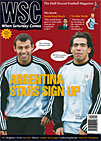 The latest split in the former Yugoslavia was the result of a vote rather than conflict, mercifully, with football playing its part in urging people to vote for independence, as Djordje Nikolic explains
The latest split in the former Yugoslavia was the result of a vote rather than conflict, mercifully, with football playing its part in urging people to vote for independence, as Djordje Nikolic explains
Soon UEFA will have a 53rd member, Montenegro. The entity officially known as the State Union of Serbia and Montenegro lasted only three years; from 1992 to 2003 the two republics had formed what was left of Yugoslavia. In May the voters in Montenegro decided, narrowly, for independence. In the next few months they will become the sixth separate country created from what was Yugoslavia. Given the closeness of the referendum, it’s even possible that football influenced the outcome.
Montenegro’s FA will get provisional UEFA membership in October and full status at the next UEFA congress, in January. The FA are headed by Dejan Savicevic, formerly of Red Star Belgrade, AC Milan and the old Yugoslavia’s 1990 World Cup quarter-final side. Although it makes sense not to play any matches till after they are formally accepted into UEFA, the FA have been criticised for not staging training sessions, even with just the best home-based players, and have not yet appointed a national coach.
The reborn country – Montenegro existed for hundreds of years until 1918 – has a decent football tradition. The FA were founded in 1931 and several players featured in the national team of the former Yugoslavia. At Italia 90 Savicevic was joined by two other Montenegrins in the side that lost on penalties to Argentina in the last eight and was still there at France 98 with six others, including Predrag Mijatovic. Two names that might ring a bell in the UK are Dragoje Lekovic, Kilmarnock’s keeper when they won the Scottish Cup in 1997, and defender Miodrag Krivokapic, who played for Dundee United and also coached in Scotland.
With a population of just 650,000, nobody expects the national team to qualify for a major tournament. The first objectives will be to escape being bracketed with San Marino, Andorra et al in the lowest pool of seeds and perhaps to cause the odd upset. Miodrag Radulovic, the Under-19s national coach, sees reasons for optimism: “When I worked with the juniors of Serbia & Montenegro, there were five Montenegrins in the side when we beat England. With those players as the basis, we ought to have a side that should at least beat Austria, Belgium or Croatia. That would be enough for a start.”
Given the limited resources, Serbian players who are eligible through family connections, or who simply decide to play for Montenegro having been overlooked for their own national team, may be called up – such “transfers” have already happened in Bosnia-Herzegovina and Macedonia. Among those based abroad, the star is Roma striker Mirko Vucinic, who scored 19 Serie A goals for Lecce in 2004-05.
According to official data, 98 per cent of the 5,304 registered players are amateurs, but almost all are paid, many being partly funded by agents, who make big profits by selling them on abroad. But there is only one big club in the new domestic league, Buducnost Podgorica, who were regular members of the old Yugoslav first division. Their annual budget is claimed to be around €300,000. If this were true, it would mean that players were being offered around €1,000 a month, which would surely lead to a mass exodus – third-level clubs in Austria and Switzerland pay more. The only other full-time professional clubs are Zeta Golubovci and Sutjeska Niksic, and many fans instead support the big two from Belgrade, Red Star and Partizan.
What influence may football have had in the referendum? First, in early spring the media announced that Chelsea would play a friendly against Buducnost on May 20 (the day before the referendum on independence). The alleged link was a Russian businessman, Oleg Deripaska, whose company Rusal was about to buy the big Podgorica aluminium factory and to become the main sponsor of Buducnost. The game never took place and the Russians have yet to complete the purchase of the factory.
Meanwhile, Savicevic will now be expected to keep a close eye on any allegations of corruption, given that he raised this issue himself in the build-up to the referendum. In a TV interview, Savicevic, then a vice-president of the Serbia & Montenegro FA, claimed that “out of every 50 league games here, around 20 to 30 are fixed”. He added that he had taken part in “two or three fixed games” early on in his career with Buducnost, but that now the situation was much worse. Pressed to name the clubs and individuals involved, Savicevic refused, saying: “It’s too dangerous, I don’t want to lose my head because of football.”
Savicevic also announced that if the people rejected independence, he would resign because he “could no longer fight the problems in Serbo-Montenegrin football”. While no one would claim that Serbian league football is entirely clean, some commentators suggested that Savicevic had simply been making a political point, aimed at convincing voters that they would be better off without their bigger neighbours.
From WSC 236 October 2006. What was happening this month